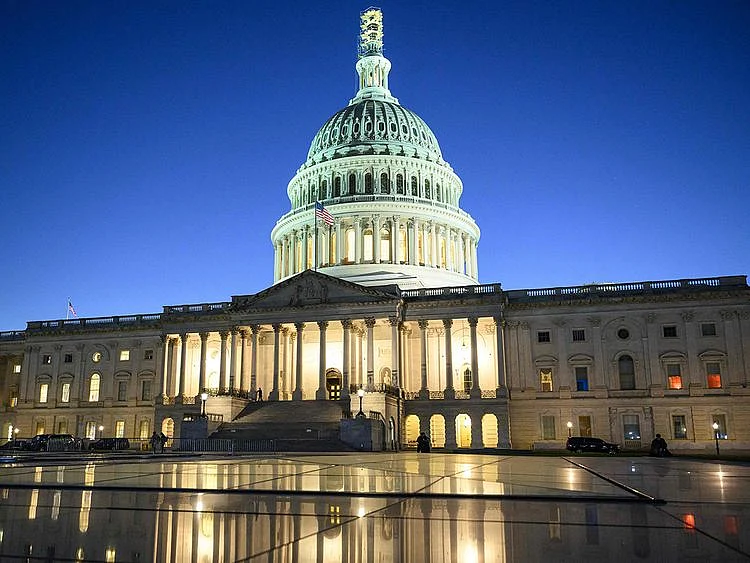Criticism of Israel in the US public discourse has been on the rise since the outset of the Gaza war. So have been attacks against it by the US government.
Last week we were witness to tactics employed by legislators on Capitol Hill aimed at essentially silencing pro-Palestinian voices just like those employed by people like Senator Jor McCarthy during the Red Scare in the 1950s, which at the time tried to silence liberal discourse by accusing those engaged in it of being “communists”, then folks considered the bete noires of the era.
On Thursday, Nov. 21, the House of Representatives passed a bill (HR 9495), known by the unwieldy, not to mention Orwellian name of The Terror Financing and Tax Penalties on American Hostages Act (a Republican-advanced bill which passed 219 to 184, with 15 Democrats voting in favour and a lone Republican against) that would grant the Treasury Department the power to revoke the tax-exempt status of any non-profit the department — on its own and without due process.
This effectively enables the government to go not only after pro-Palestinian groups critical of Israel or groups that advocate for Palestinian rights, including ones involved in campus protests, but also aid groups that channel aid to Gaza and the West Bank.
"No protection against abuse"
The bill outraged the Civil Liberties Union. “By voting HR 9594, the House of Representatives chose fear over freedom”, Kia Hamadan Chey, the group’s senior federal policy counsel, said in a statement.”After over one hundred years of defending civil liberties in this country, we know that the American people will not sit quietly as politicians try to ram through anti-democratic legislation like this one”.
Amnesty International also criticised the bill, saying, “While it offers the facade of due process, this bill is broad, dangerously vague and offers no protection against abuse”.
It took Jamie Raskin, who had for 25 years taught constitutional law at American University in Washington, DC, before he was elected to represent the state of Maryland in the House, to give the most scathing indictment of the bill after he took the floor in the House chamber during the debate.
In his speech, he effectively called the bill both un-American and dangerous, identifying it as a “werewolf in sheep’s clothing”. Raskin said the bill seemed to give a single government functionary what amounted to the right to unilaterally revoke the tax-exempt status of a non-profit based solely on that functionary’s arbitrary determination that that non-profit is “terrorist” or “terrorist-affiliated”.
This bill is not, as it may appear at first blush, a charade put on by donor-pandering politicians. This is legislation that truly brings with it chilling consequences for the public discourse, for it will give the new administration, as Representative Raskin evocatively put it, “Orwellian powers and impose a Kafkaesque nightmare on America’s non-profit”.
And lest we forget, Tulsi Gabbard, the president-elect’s pick for national intelligence, is already on record criticising hundreds of thousands of student protesters on campuses across the country for their right to protest over Gaza.
Un-American indeed
And one wonders how this could be happening in “the land of the free and home of the brave”, the phrase in the Star Spangled Banner, America’s national anthem, that in essence tells American citizens that their nation is one where people are entitled to their beliefs, entitled to speak up freely on behalf of causes that resonate with them, entitled to the open, free-for-all discourse accorded them by the First Amendment in the Bill of Rights.
If there is a bedrock principle underlying our understanding of that Amendment, it is that the government has no business interfering in how people express themselves. That’s the law of the land.
As Supreme Court Justice William Brennan (d. 1997) put it in his 1989 decision on Texas v. Johnson (a case where one Gregory Lee Johnson was charged with “desecrating a revered object” after he burnt the American flag outside the 1984 Republican National Convention): “The government may not prohibit the expression of an idea simply because society finds the idea offensive or disagreeable”.
Jonson’s, said Justice Brennan, was an “expressive act”.
If you agree with that, you agree that Bill HR 9495 violates not only the right of people who want to speak but also the right of people who want to listen — a bill that muzzles the free flow of ideas in society, which in turn limits the expansion of our strategies of insight in the public discourse and impoverishes the development of our intellectual autonomy.
You wouldn’t imagine this is happening in a land that considers itself free, inhabited by a people who pride themselves on being brave.
— Fawaz Turki is a noted academic, journalist and author based in Washington DC. He is the author of The Disinherited: Journal of a Palestinian Exile
Sign up for the Daily Briefing
Get the latest news and updates straight to your inbox
Network Links
GN StoreDownload our app
© Al Nisr Publishing LLC 2026. All rights reserved.
